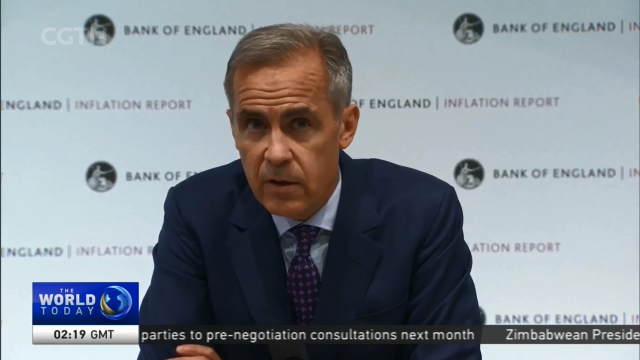
10:45, 03-Aug-2018
UK Economy: Bank of England raises interest rates to highest level in decade
Updated
10:24, 06-Aug-2018
02:42

The Bank of England has hiked interest rates to their highest level in nearly a decade. Base rates in Britain crashed to record lows in the wake of the 2008 financial crash and have remained there with just once rise ever since. But on Thursday, the Bank's Monetary Policy Committee voted unanimously for a 25 point rise in loan charges. As Richard Bestic reports from London, the Bank's decision is fraught with risk.
The Bank of England had trailed its rate rise extensively and the markets duly priced it into the value of the Pound. What was only the second rate rise since the financial crash in 2008 designed to rein in rising inflation.
MARK CARNEY GOVERNOR, BANK OF ENGLAND "Employment's at a record high, there's very limited spare capacity in the economy, real wages are picking up and external price pressures are declining. With domestically-generated inflation building and the prospect of excess demand in the economy emerging, a modest tightening of monetary policy is now appropriate to return inflation to its two percent target and to keep it there."
Retail sales boosted by a Royal Wedding are included in the arguments for a hike. However, in Britain an entire generation has entered the workforce with interest rates at levels continually below historic norms of around five percent. Many homeowners are on the limits of affordable home loan repayments and, according to the ONS the Office of National Statistics, British households last year spent too much, and share $32.5 billion dollars of debt. And then, of course, there's Brexit.
MARK CARNEY GOVERNOR, BANK OF ENGLAND "The Bank is well prepared for whatever path the economy takes, including a wide-range of potential Brexit outcomes. The UK banking system has sufficient capital to continue lending even through a disorderly cliff-edge Brexit, however unlikely that might be."
It is a balancing act though, low unemployment in Britain masks high underemployment says the ONS and industrial economic growth is running at a sluggish 0.4 percent.
RICHARD BESTIC LONDON "The rate rise was among the most difficult of choices the Bank of England's been called on to make in a decade. And while it gives a buffer zone ahead of any potential economic hiccups ahead, the rate rise holds real risks, particularly for those who can afford them least. Richard Bestic, CGTN, London."

SITEMAP
Copyright © 2018 CGTN. Beijing ICP prepared NO.16065310-3
Copyright © 2018 CGTN. Beijing ICP prepared NO.16065310-3